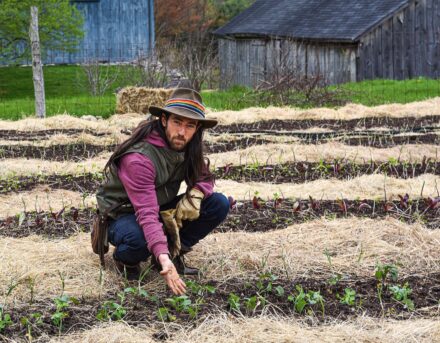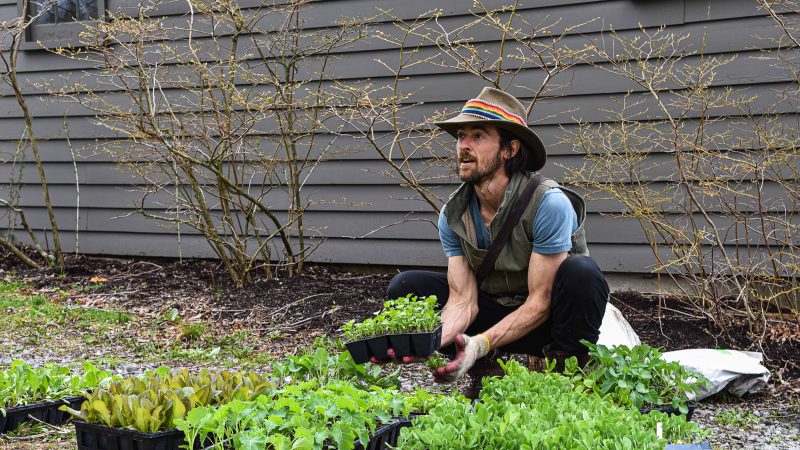Greenagers’ New Farm Manager is Bringing a Full-Scale Educational Farm to Life at April Hill
On the Greenagers wish list, after its 2019 purchase of the April Hill property as a home for youth education and conservation: A truly sustainable and educational working farm.
The expansive, fertile property was waiting for a plan and action to diversify its agricultural potential. But the farm project would require a skilled, experienced farmer, who is also an educator, who would also be an advocate for Greenagers and connect with the region’s teens and young adults.
Ultimately, I feel the land is guiding what has and will happen here.
As it turned out, the right person for the job was just over the hill, in Mt. Washington: Justin Torrico-Fawks brought a world of expertise to the job.
Locally grown and raised, Justin’s interest in sustainable farm development and management has taken him to Peru, Indonesia, and CSA farms in the U.S. In Peru, he designed and managed permaculture and regenerative agriculture programs — including some yoga instruction, as he’s also a certified Kripalu yoga teacher. Back in 2010, he founded, along with a youthful cohort, Community Cooperative Farms which operated for five years in southern Berkshire County. During a summer with Greenagers, Justin led a summer camp program for middle schoolers focusing on climate change and permaculture. That job planted a seed that would return him to Greenagers again.

The fit could not have been better. Greenagers introduces teens and young adults to just about every aspect of agriculture and conservation stewardship, and nurtures just about any peripheral curiosity that might arise. Justin brings an ideal set of skills: farm management, expertise with farm equipment, seed-saving and plant propagation. On his skills list are silvopasture and polyculture orchard development, small animal husbandry, fresh food processing and storage, and knowledge of herbal and medicinal plants. Add to that his educational leadership background, and Greenagers has the ideal farm steward, farm manager and farming educator.
“We are very happy to have local talent return to the area to work and share agricultural wisdom and skills with our local youth in the agricultural field,” said Will Conklin, Greenagers’ executive director. “Justin is a perfect fit for April Hill and Greenagers.”
A conversation with Justin follows…
Q: What prompted you to come home to the Berkshires?
A: I have been coming back to Mount Washington and the Berkshires every year to spend time with family and friends and expand the family farm. The first thing in my mind last year was the desire to meet my new niece, who was born in the winter. This year I was ready to start a farm again, and I wanted to explore whether that could happen close to my hometown.
Q: What’s the status of your farm development at April Hill?
A: It has been many years since April Hill has been a functioning farm, so we are now renewing and restoring the foundation for a new generation of farm stewardship. We are in the initial stages of developing the farm in the areas closest to the house and barns. We have planted 30 new fruit trees and bushes in the house orchard, built a new apiary with 5 hives which will quickly expand to 8 or 10. We are creating a ¾-acre demonstration garden with perennials fruits, nuts, and medicinal plants, as well as, all the annual vegetables and nursery beds for seed saving and plant propagation. We also have been working on replanting two existing hedgerows and creating another — these will include hybrid chestnut, hybrid hazelnut, mulberries, elderberries, chokecherry, persimmons and quite a few other plants. We are also trialing a few new varieties of thornless blackberry and raspberries. We now have the Mount Everett High School sheep arriving for the summer to graze, and 30 ducklings will soon be roaming the orchard. All of this work is largely a small scale demonstration of the larger design being developed for 80-plus acres on this wonderful piece of earth.
Q: What programs do you see coming out of this new farm?
A: I see the Greenagers farm at April Hill as the foundation for a regional regenerative agriculture education program. This can include compost education programs and production, plant propagation programs, seed-saving programs and a seed bank, a living plant bank, an agroforestry nursery development.
We can also include animal husbandry, mushroom cultivation, regenerative enterprise development, food processing, and cooperative local farm processing.
I see the Greenagers farm filling a gap in the regional farming movement and becoming a model of industry-leading practices in the regenerative agriculture movement and teen and young adult farm stewardship that our world needs.
Q: What role will young people have in expanding, managing and growing the farm’s role in the community.
A: Young people are creating this farm as we speak. Our farm programs are designed to maximized youth input and exploration of what interests them. My goal is to build the space for young people to explore something they would like to study, or maybe pursue in work and business. For instance, we have several youth interested in mycology, so we are growing out mushroom spawn to inoculate logs. We have planted hundreds of trees in the last two months, and I myself have only planted 5 to 10. The rest were planted by our small group of young farmers.
Q: Have you noticed whether COVID-19 has had an impact on local farms and CSAs?
A: Yes I have—it’s having a positive impact on demand for CSA share sales. It has also created more work for local farms because of the need to have online marketplaces, but overall I would say this crisis has brought to the fore what matters most to people, and it’s clear they want high quality local food. The COVID-19 crisis has also highlighted food access issues, and I am excited to see that more people want to support local farms that are getting food to people in need.
Q: What is “silvopasture and polyculture orchard development?”
A: Very simply put, Silvopasture is the deliberate integration of trees and grazing livestock production. It is the growing of trees for either timber, nut, fruit, animal fodder or a combination of those, while rotationally a combination of grazing animals underneath. A famous example is the ancient oak and pig silvopastures of Spain that produce the artisinal Iberico ham.
Here at April Hill I am designing a fruit silvopasture and a chestnut silvopasture. The fruit silvopasture will have fruit trees (predominantly stone fruit apple, peach, plum etc.) planted 30 feet apart on contour, and this will be grazed by sheep, followed by chickens/ducks.
The chestnut silvopasture will have rows 40 feet apart on contour and will be grazed by cattle, then sheep, then chickens/ducks.
A polyculture orchard is not just grass and one type of fruit tree. It is made up of many layers from different types of medicinal roots and flower bulbs, bushes, dwarf trees, then full size trees.
In the house orchard here we have planted apple, pear, Asian pear, sweet cherry, sour cherry, cornelian cherry, plum, grape, schisandra berry, asparagus, rhubarb, comfrey, burdock, three types of clover, spring bulbs, yarrow. We also have Good King Henry (spinach), cleavers, borage, poppies, and red currant.
Q: What would be your ideal farm program at April Hill, if the sky was the limit?
A: I do not feel limited in any way at April Hill! What I have described here is both the ideal and what I believe we can realize. I think that it is our duty and responsibility to share with the youth of this area, and region, a vision for a livable, abundant future full of possibility.
It’s the land that supported and called Greenagers and myself to be stewards of land, flowers and honey. I am in wonder of the beautiful vision that it reflects everyday.
In nature, regeneration is fundamental: one wave of growth makes way for the next and so on forever, my ideal farm program will reflect that.
Ultimately, I feel the land is guiding what has and will happen here.
Photos by McGurn Media.

